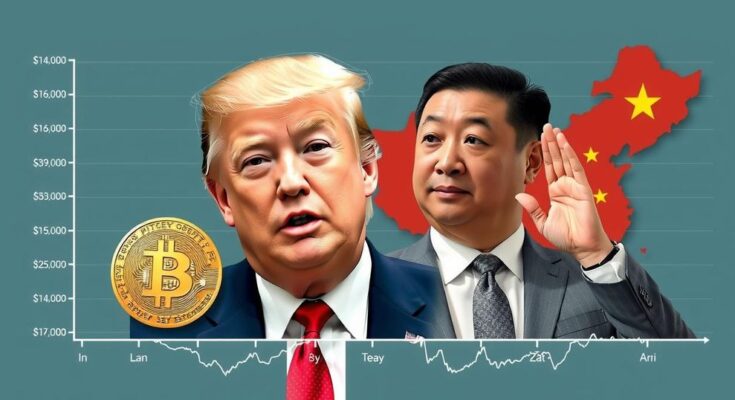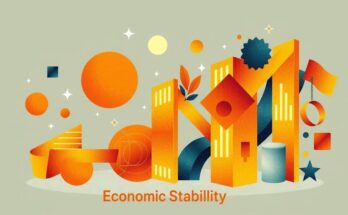In 2024, global economic recovery continued post-COVID-19, with Trump’s return to power emphasizing protectionism. Economic issues like inflation dominated voter concerns, influencing elections worldwide. Increased regulation of Big Tech and a resurgence in Bitcoin’s value were key trends. Meanwhile, China’s economic measures were seen as inadequate for desired growth, highlighting the complexities of contemporary economic governance.
In 2024, economic issues ranked highly among voter priorities as over two billion individuals worldwide participated in elections, reflecting the ongoing concerns regarding rising living costs in the aftermath of the COVID-19 pandemic. Despite a global economic stabilisation, growth rates remained below pre-2020 levels. The year was marked by Donald Trump’s presidential victory, which promised a return to aggressive protectionist policies, alongside substantial regulatory efforts in the technology sector and significant movements in cryptocurrency markets.
Trump’s administration indicated a revival of protectionist trade strategies reminiscent of his first term. His campaign pledged to impose tariffs exceeding 60% on Chinese imports, as well as a blanket 20% tariff on all other imports. Additionally, a potential 25% tariff on Canadian and Mexican imports raised concerns regarding the future of trade agreements among North American countries. Economists warned that such tariffs could exacerbate inflation and disrupt global supply chains.
In response to the rise of technology giants, governments around the world were engaged in regulatory actions aimed at curbing Big Tech’s influence. The EU enacted the Digital Services Act and Digital Markets Act, establishing rules for online platforms, while the AI Act introduced regulations based on the perceived risk of artificial intelligence applications. Despite efforts, experts asserted that a unified global framework for AI regulation remains elusive.
Trump’s triumph also brought relief for TikTok, which faced a ban in the U.S. unless its Chinese parent company, ByteDance, divested. The president-elect promised to intervene on behalf of the platform, though no solid plan was outlined. Concurrently, the U.S. social media landscape grew increasingly polarized as right-leaning platforms gained traction, contributing to a more fragmented discourse.
The year was challenging for incumbents around the globe as economic issues dominated election agendas, with notable shifts in leadership occurring in the U.S., UK, Japan, and India, among others. The surge in discontent over inflation was a significant factor translating into electoral losses for sitting administrations. Conversely, Ireland showcased a unique trend wherein the incumbent parties retained sufficient seats for coalition discussions.
Business magnates gained an unprecedented foothold in government, notably with Trump appointing prominent supporters, including Elon Musk and other billionaires, to key positions in his Cabinet. This development raised concerns about the intertwining of wealth and political power, epitomized by the indictment of Indian billionaire Gautam Adani, a close ally of Prime Minister Modi, on allegations of fraud.
In the cryptocurrency realm, Bitcoin experienced a notable resurgence following Trump’s electoral victory. The digital currency’s value spiked from approximately $68,000 to over $100,000 as Trump’s administration expressed a commitment to transforming the U.S. into a leading hub for cryptocurrencies. Trump’s remarks indicated a substantive policy shift toward the promotion of digital financial systems through key appointments in his administration.
China, meanwhile, faced internal economic challenges, prompting cautious measures to stimulate growth, including reductions in bank reserve requirements and interest rates. However, analysts suggested that these efforts were insufficient to meet the country’s growth targets, reflecting broader hesitancy in adopting aggressive economic stimulus mechanisms typically associated with global recoveries.
The events of 2024 were shaped by global economic recovery trends, as nations contended with the gradual aftermath of the pandemic. With inflation and the cost of living posing critical challenges to voters worldwide, elections represented a decisive platform for expressing dissatisfaction with existing policies. Furthermore, the rise of digital currencies and growing scrutiny of technology companies reflected changing paradigms in economic governance. Key political shifts, particularly with Trump’s return to power, also emphasized a trend towards protectionism and regulation as fundamental economic themes.
In summary, the economic landscape of 2024 was characterized by a complex interplay of rising inflation, significant political shifts, and evolving regulatory frameworks in response to technological advancements. As global leaders grappled with the associated challenges, the outcomes of electoral responses underscored the pressing concerns of voters regarding living costs and economic stability. Trump’s policies reinforced protectionist sentiments, while the appetite for cryptocurrencies indicated shifting financial paradigms. The ongoing developments in the U.S. and globally will likely set the tone for future economic trajectories.
Original Source: www.aljazeera.com




